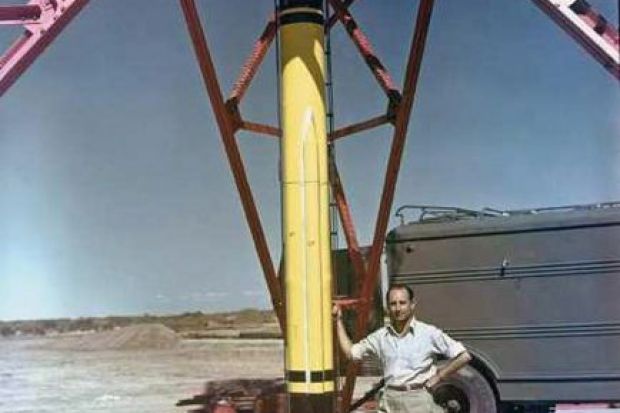If you think you know the story of the space race, think again. This book has it all: rocket scientists, wild magicians, duplicitous psychoanalysts, Scientologists, spies, Communists, love, vengeance and atom bombs. It’s a meticulously researched yet immensely readable story of the personalities and politics of the early space age in America. But it is not the usual tale recounted in documentaries and museum exhibitions. Wernher von Braun and Robert Goddard, generally considered the parents of the US space programme, are not the heroes here. This is about a quieter man and a little-known rocket: Frank Malina and the WAC Corporal, the first US rocket truly to reach outer space.
As Fraser MacDonald points out, Goddard is hailed as the father of US rocketry for his pioneering work in liquid fuels, but his aversion to sharing meant that his rockets have no natural descendants today. Rather, it is Malina who represents home-grown space technology, so why is he not more celebrated?
In the 1940s, Malina was a student at the California Institute of Technology in Pasadena, where he became the centre of a group making a sounding rocket to study the unknown regions of the upper atmosphere. His partner in crime was Jack Parsons, a talented if unruly rocket enthusiast and a follower of the English magician Aleister Crowley, who was once called “the wickedest man in the world”. The pair’s research led to the foundation of Nasa’s Jet Propulsion Laboratory. But while Parsons was hosting riotous parties devoted to sex magick in a sprawling Hollywood mansion, Malina was active in Unit 122 of the Communist Party. He was troubled by the growing military interest in rockets as weapons and dreamed of a fairer world for all. This was not unusual; many scientists worldwide were party members at the time.
The astonishing part of this story lies in the nexus between Jack’s magical practices, Frank’s Communist leanings and the labyrinthine workings of McCarthyism. MacDonald weaves the delicate threads of intrigue into a narrative that illuminates the fears and excesses of Cold War America. I have never before seen anyone express with such clarity the contradiction at the heart of the space age: that Communist scientists were pursued and vilified in the McCarthy era while actual Nazis such as von Braun dominated the US space programme. Technology is often assumed to be independent of messy human affairs. MacDonald shows how personal politics had a profound effect on the trajectory of US technology.
Perhaps Malina was fortunate: he left the country to take up a position in the newly created United Nations Educational, Scientific, and Cultural Organisation in the 1950s and avoided arrest. Despite his monumental contributions to US rocketry, he was declared a fugitive and was unable to return to his country. He lived in Paris until his death in 1981.
The world in this book is not one of men alone; MacDonald also explores the inner lives and ambitions of the women who populated it. It is refreshing to read an account of these events that is so nuanced, seamlessly melding the personal and the scientific. This expert history offers insights into the early space age with dazzlingly beautiful writing and a keen eye for irony.
Alice Gorman is a space archaeologist and senior lecturer at Flinders University, Adelaide.
Escape from Earth: A Secret History of the Space Rocket
By Fraser MacDonald
Profile Books
368pp, £20.00
ISBN 9781781259702
Published 27 June 2019
后记
Print headline: A Red’s rocket’s glare




